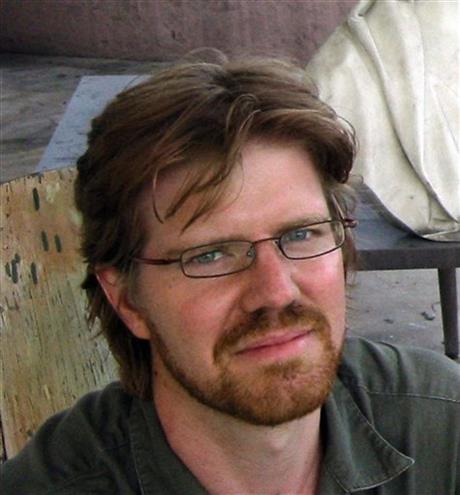
By JOSHUA GOODMAN
This undated photo provided by Miami Herald Andean Bureau Chief Jim Wyss, via The Miami Herald, shows Jim Wyss. Wyss was detained by Venezuelan authorities while reporting on politics and the chronic shortages in the South American country, the newspaper said Friday, Nov. 8, 2013. (AP Photo/Jim Wyss via The Miami Herald)
CARACAS, Venezuela (AP) — A Miami Herald journalist was being held for a second night by Venezuelan authorities after he was detained by security forces while reporting on the country’s economic crisis.
Jim Wyss, the newspaper’s Andean bureau chief, was detained Thursday by the National Guard in San Cristobal, a western city near the border with Colombia that is the center of a vibrant black market by Venezuelans seeking to circumvent rigid currency controls. The Herald said in a story on its website that Venezuelan journalists reported seeing him in custody but were barred from approaching him.
“We are very concerned,” the Herald’s Executive Editor Aminda Marques Gonzalez Marques said in a statement. “There doesn’t seem to be any basis for his detention and we’re trying to figure out what’s going on.”
Authorities haven’t provided any information about Wyss’ detention, his whereabouts or whether he is facing charges. Nor did President Nicolas Maduro mention the case during a four-hour televised speech Friday night.
The Inter American Press Association, in joining the Herald’s call for the reporter’s immediate release, said in a statement that he had been transferred Friday to Caracas and was being held in solitary confinement.
A U.S. State Department spokesperson said in a statement Saturday, “We are aware of reports on the arrest of a U.S. citizen. We are seeking further information on these reports from the Venezuelan government.”
“If these reports turn out to be true, we will immediately seek consular access, as we do in the every case of a detained U.S. citizen.”
Wyss, who is based in Bogota and has made many trips to Venezuela, traveled to San Cristobal to report on next month’s municipal elections, which are taking place amid an economic crisis marked by 54 percent inflation and shortages of staples such as milk and toilet paper.
Maduro blames hoarding and speculation by the private sector, and accuses right-wing agitators and the U.S. government of waging an “economic war” to destabilize his government. However, economists say that only scrapping the decade-old controls imposed by the late Hugo Chavez can curb a sharp slide in the currency’s value on the black market.
Journalists have encountered harassment before while reporting on the crisis. Last week, three reporters for Caracas newspaper Diario 2001 were detained, and one allegedly beaten by police, after witnessing a group of frenzied shoppers break through a barricade to receive a government-provided Christmas food basket.
Government officials also regularly vilify in public members of the international media as opponents of the Chavista revolution. Still, except for the six-week jailing of an American documentary filmmaker earlier this year, the detention of foreign journalists for more than a few hours is almost unknown.
Wyss himself was nearly barred from entering Venezuela shortly before Chavez’s death in March, according to the Herald report.
Claudio Paolillo, chairman of a press freedom committee at the Inter American Press Association, said he was bewildered by Wyss’ detention, calling it a “new demonstration of intolerance by a regime that day after day shows its contempt for the work of journalists.”



